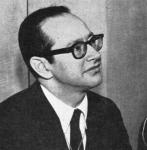PAUL DESMOND
A Tribute
by Les Tomkins

The jazz audience
Back in the crook
Giant jazzman, gentle wit...
Sax viewpoint
Tribute
Desmondisms
When a great jazz musician dies, it is always an occasion for sadness coupled with a feeling of artistic deprivation. When the musician is an absolute personal favourite, as well as someone you have met several times, talked to, and liked a great deal, the sense of loss is that much deeper. In my case, Paul Desmond, who died on May 30, 1977 at the age of 52, comes into the latter category.
Paul Desmond was a superlative jazz stylist and improviser; he was also a highly articulate, intellectual man. In my last interview with him I headed the first piece: “Giant jazz man, gentle wit”. By “gentle wit”, I was referring to the wry, sardonic humour that spiced any chat with ,him — never malicious, frequently self–mocking. Once you knew him, the wit seemed somehow in affinity with his music. Brief examples: “Playing jazz requires an incredible amount of luck combined with a certain amount of insanity. And a certain amount of talent— he said, immodestly”; ‘Take Five’ was made before any of us could play in five. There’s a couple of places where that fifth beat takes me by surprise, and I don’t know what to do about it. I just sort of wait for it to go away; it goes away, and I start all over again!”
His alto sound, one of the most instantly recognisable ever, and his direct, unflorid approach caused the label ‘cool’ to be put on him at times. But during his seventeen years with the Dave Brubeck Quartet, and subsequently, most of his solos, full of sinuous beauty as they were, generated melodic and rhythmic excitement. Controlled abandon, you could say.
Musicians of all persuasions describe his playing as “gorgeous’‘— and that does not imply there was anything insipid or colourless about it.
A lot of people wondered why he stayed so long with the same group. The eccentric piano playing of Dave Brubeck was denigrated by the critics, while Desmond was praised. In point of fact, their association yielded a remarkable consistency of swinging, creative jazz music which has already stood the test of time, and will continue to do so.
Paul’s attitude was : “I would not change a bit of it. I know so many guys who have almost gotten there but not quite, and have wandered off into other fields.”
Of his recent reunions with Dave, he said: “After about four years doing different things, we got back together again and played. And it felt so marvellous— I realised it’s still the best thing going.”
The dissolution of the full–time Brubeck—Desmond partnership proved to be no musical tragedy. Dave went on to a variety of productive jazz or semi– jazz projects; Paul went on, after a period of rest, to further solo eloquence. By no means for the first time, I find myself at total odds with an Evening Standard writer. In the May 31 news item, James Greenwood wrote: “His playing became more and more predictable, and gradually inspiration left him, except for very occasional concerts.” Predictable? Only inasmuch as a familiar voice that you love to hear is predictable. But it was a voice that always had utterly entertaining things to say.
If anything, in latter years he reached new heights of expression. Nobody of musical awareness could possibly say that his CTI albums (produced by Creed Taylor for A&M and his own label) lacked inspiration. Every one was a veritable gem. There were the exquisite sessions with strings. plus people like Herbie Hancock, Ron Carter, Airto Moreira, and with writing by Don Sebesky: “Summertime” and “From The Hot Afternoon”. Then an A&M masterpiece with the same team. minus Taylor: “Bridge Over Troubled Water”— the songs of Paul Simon.
There were small group delights, linked with guitars: Gabor Szabo and Gene Bertoncini on “Skylark”, ‘Ed Bickert on “Pure Desmond”. And some pleasurable extras: his contributions to his great friend, guitarist Jim Hall’s “Concierto” album, particularly the Rodrigo title track, to ‘Chet Baker’s “She Was Too Good To Me”, and to Creed Taylor’s “Giant Box”— notably a version of Rachmaninov’s “Vocalise”. I owe Paul Desmond a personal debt. Prior to mid— ‘74, I had not really investigated chamber music, believing it was not for me. But Paul’s obvious addiction to it made me think again. Beginning with the Bartok quartets he mentioned, I went into it, and discovered it was for me.
Thanks for that, Paul. And thanks for all you did to raise standards, widen horizons and gladden hearts with your wonderful alto playing. Les Tomkins
Copyright © 1977, Les Tomkins. All Rights Reserved.